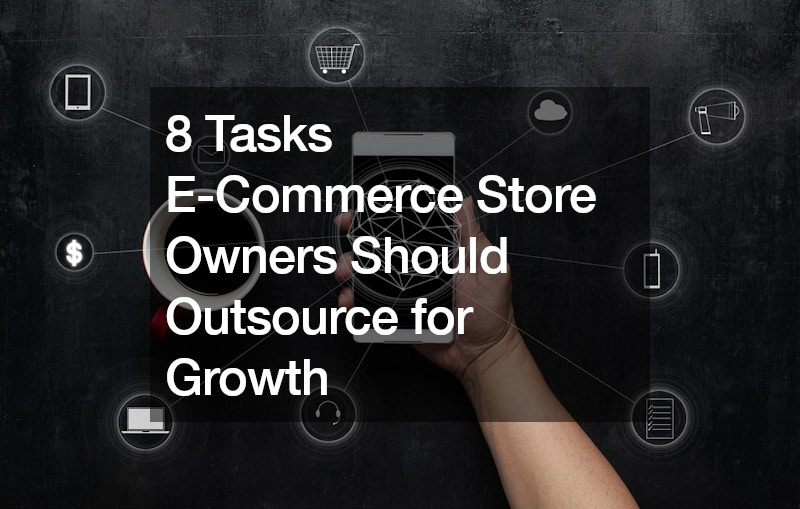In the fast-paced world of e-commerce, success often hinges on efficient resource allocation. For many e-commerce store owners, the process from launching a store to scaling it involves navigating a myriad of tasks, some of which can become overwhelming when done in-house. Recognizing when and what to outsource can significantly streamline operations and accelerate growth. Here are eight essential tasks e-commerce store owners should consider outsourcing to enhance productivity and focus on strategic business aspects:
1. Customer Service
Outsourcing customer service to virtual assistants or specialized customer support agencies not only ensures prompt and professional handling of customer inquiries, complaints, and support requests but also enhances overall customer satisfaction and retention. By leveraging the expertise of trained professionals in customer service, e-commerce store owners can establish a reputation for reliability and responsiveness, crucial in building trust and loyalty among their customer base.
Additionally, outsourcing customer service allows businesses to scale their support operations efficiently. Virtual assistants or customer support agencies can manage peak periods and handle diverse customer needs with flexibility, ensuring consistent service quality without the need for substantial investments in infrastructure or training.
2. Product Photography and Creatives
High-quality visuals are crucial for attracting and converting customers in the competitive e-commerce landscape. While basic product images can be sourced from suppliers, unique and compelling visuals tailored to brand identity often require professional photography and videography. Outsourcing these tasks to skilled creatives ensures consistent, visually appealing content that enhances brand perception and drives engagement.
Moreover, outsourcing product photography and creative content creation allows e-commerce store owners to tap into the latest trends and techniques in visual marketing. Professional creatives bring not only technical expertise but also a fresh perspective on storytelling through visuals. They can conceptualize and execute thematic photo shoots or video campaigns that resonate with target audiences, effectively communicating brand values and enhancing overall brand narrative.
3. Marketing and Advertising
Launching effective marketing campaigns and managing advertising budgets demands specialized skills in digital marketing and media buying. Outsourcing these tasks to experienced marketing agencies or freelancers allows e-commerce owners to access expertise in optimizing ad performance, refining targeting strategies, and maximizing return on investment (ROI).
In addition, outsourcing marketing and advertising tasks enables e-commerce store owners to leverage industry insights and data-driven strategies that may not be readily available in-house. Experienced agencies or freelancers bring a depth of knowledge in analyzing market trends, consumer behavior, and competitor activities. They can implement advanced analytics tools to track campaign performance, measure key performance indicators (KPIs), and iterate strategies based on real-time data insights.
4. Inventory Management
Outsourcing inventory management goes beyond just logistics; it also involves predictive analytics and demand forecasting. Professionals in this field utilize advanced software and algorithms to predict consumer demand patterns accurately. By doing so, they can optimize inventory levels and reduce the costs associated with excess inventory or stockouts.
Outsourcing also allows e-commerce store owners to benefit from economies of scale and negotiated pricing with suppliers, further enhancing cost-efficiency and profitability. This strategic partnership not only streamlines operations but also positions the business for scalable growth in a competitive market landscape.
5. Accounting and Bookkeeping
Beyond routine financial tasks, outsourcing accounting and bookkeeping can provide strategic financial guidance. Qualified professionals not only ensure compliance with tax regulations but also offer insights into cost-saving opportunities, profitability analysis, and financial forecasting.
By outsourcing these critical functions, e-commerce owners can gain practical financial know-how, including international tax laws or cash flow management. This proactive approach not only minimizes the risk of financial errors but also fosters a clearer financial picture, making way for informed decision-making and sustainable business expansion.
6. Website Maintenance and Optimization
Outsourcing website maintenance to specialists extends beyond technical upkeep to encompass continuous improvement and innovation. These experts stay abreast of industry trends and user experience best practices, implementing enhancements that drive higher conversion rates and lower bounce rates. They conduct regular audits to identify and rectify performance bottlenecks, ensuring that the website remains responsive and reliable across devices.
Moreover, outsourcing website optimization frees up internal resources to focus on strategic initiatives, such as launching new product lines or entering new markets. This collaborative approach not only enhances the e-commerce platform’s functionality but also fortifies its competitive edge in the digital marketplace.
7. Order Fulfillment and Shipping
Outsourcing order fulfillment and shipping to specialized third-party logistics (3PL) providers in e-commerce order fulfillment is crucial for enhancing operational efficiency and customer satisfaction. These 3PL providers offer advanced warehouse management systems and logistics expertise that streamline inventory management, order processing, packing, and shipping processes.
Furthermore, outsourcing to 3PL e-commerce order fulfillment providers supports scalability by providing flexible warehousing solutions and manpower to handle fluctuating order volumes. This flexibility allows e-commerce businesses to efficiently manage peak periods and seasonal demands without incurring additional overhead costs.
8. Social Media Management
Maintaining a vibrant presence on social media platforms is vital for brand visibility and engagement. Outsourcing social media management to experienced professionals ensures consistent posting schedules, engaging content creation, and effective community management. As a result, e-commerce owners can build a strong social media presence while focusing on overarching business strategies.
The Bottom Line
Outsourcing certain tasks in e-commerce isn’t just about delegating responsibilities; it’s about optimizing resources to drive growth and scalability. By strategically outsourcing customer service, creative production, marketing, inventory management, accounting, website maintenance, fulfillment, and social media management, e-commerce store owners can unlock operational efficiencies, enhance customer satisfaction, and position their businesses for sustainable success. Treating outsourcing as a strategic tool enables e-commerce entrepreneurs to focus on innovation, market expansion, and creating compelling customer experiences, resulting in long-term growth in the competitive digital marketplace.
.






